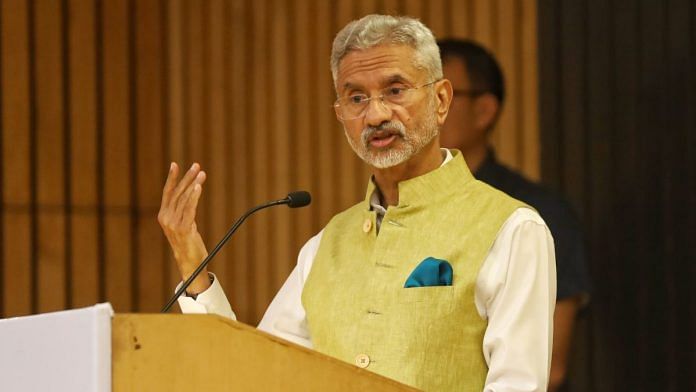New Delhi: Foreign policy is resonating among more people across India, even in second and third-tier towns of the country, said External Affairs Minister S. Jaishankar during an event in Delhi at a time when general elections are underway in the country.
“[It was] a pleasant discovery that how much foreign policy is actually resonating among people,” he said Thursday, adding, “’I’ve been to second and third tier towns of India where people are interested in foreign policy and do believe, in some way, that it should be part of the metrics of government.”
The foreign minister was speaking at the launch of economist Surjit Bhalla’s new book, How People Vote, which predicts that the Bharatiya Janata Party (BJP) will secure roughly 330 seats in the 2024 Lok Sabha election. ThePrint’s Editor-in-Chief Shekhar Gupta was also present at the event to discuss the book.
Among the other attendees was the Ministry of External Affairs (MEA) Joint Secretary (PAI Division), J.P. Singh, in a rare public appearance.
Also Read: ‘Modi mehnat, not magic’—Book launch in Delhi turns into BJP’s campaign for PM’s leadership
‘Reel culture’
Commenting on the growing interest in Indian foreign policy among youngsters or Gen Z, Jaishankar talked about the “reel” culture on social media.
“It’s very interesting if you follow reel culture. It has promoted awareness and created interest in a lot of subjects, and in many ways, it is reflective of a sense of pride and aspirations. We typically associate it with the Gen Z, which would be 10 percent of the electorate,” he noted.
An estimated 2 crore young Indians will vote for the first time in this election, according to the Election Commission.
While discussing his book, Bhalla used Jaishankar’s remarks about growing interest in foreign policy as an analogy of how an economic model is sound if, a majority of the time, you don’t need to explain it.
“If you can explain 60-70 percent of the variation in whatever you’re looking at, you’ve got a superb [economic] model. That means 30 percent of the time, you’re not having to explain,” Bhalla told the audience.
While offering his remarks, Jaishankar argued that, in the past five years, the Narendra Modi government has improved the on-ground delivery of welfare programmes and initiatives.
“Since the last elections, the delivery on the ground as a result of various yojanas (schemes) and initiatives has been enormously effective. In fact, it’s a paradox that a lot of it has been facilitated and hastened and made more intensive by the Covid-19 period,” he remarked.
The minister highlighted that in the political space, the labharthi (beneficiary) factor is something that is very crucial in any political calculation. “I stress that because those who are not beneficiaries of these programmes, perhaps do not readily appreciate the impact it has made,” he added.
(Edited by Richa Mishra)
Also Read: ‘People will rescue democracy’—Ex-law minister’s book launch discusses politics with shayari



